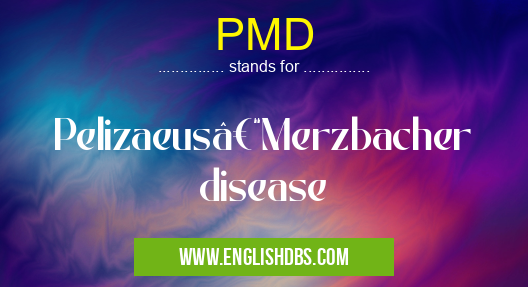What does PMD mean in LABORATORY
Pelizaeus-Merzbacher disease (PMD) is a rare, inherited neuromuscular disorder that affects the central nervous system. PMD is caused by mutations in the proteolipid protein 1 (PLP1) gene on the X chromosome and is characterized by delayed motor development, weakness in the legs, lack of muscle coordination, and abnormal reflexes. In addition, affected individuals may have difficulty speaking and swallowing as well as nystagmus (involuntary eye movements), seizures, emotional problems, and intellectual disability. The severity of symptoms varies greatly among people with PMD. Treatment for this condition typically involves management of symptoms such as physical therapy and medications for seizures or other neurological issues.

PMD meaning in Laboratory in Medical
PMD mostly used in an acronym Laboratory in Category Medical that means Pelizaeus–Merzbacher disease
Shorthand: PMD,
Full Form: Pelizaeus–Merzbacher disease
For more information of "Pelizaeus–Merzbacher disease", see the section below.
» Medical » Laboratory
Meaning
PMD stands for Pelizaeus-Merzbacher Disease, which is a rare hereditary neurodegenerative disorder that affects the central nervous system. It is caused due to mutations in the proteolipid protein 1 (PLP1) gene located on chromosome X which leads to delayed motor development, weak leg muscles, lack of coordination and abnormal reflexes in infants. People affected with this condition often also suffer from speech and swallowing difficulties along with nystagmus (involuntary eye movement), seizures, emotional problems and intellectual disability varying in intensity.
Causes
The cause of Pelizaeus-Merzbacher disease is an inherited genetic mutation on chromosome X in the proteolipid protein 1 (PLP1) gene. Symptoms appear early during infancy when normal brain development does not occur due to faulty myelin formation in nerve cells leading to developmental delays and other neurological complications mentioned above.
Diagnosis & Treatment
Diagnosis involves physical examination along with medical history review while genetic testing helps confirm diagnosis if required. Unfortunately there is no specific treatment or cure available for this condition; however medications can be used to manage associated symptoms such as seizures while physical therapy helps improve muscle strength thereby enhancing quality of life.
Essential Questions and Answers on Pelizaeus–Merzbacher disease in "MEDICAL»LABORATORY"
What is Pelizaeus–Merzbacher Disease (PMD)?
Pelizaeus-Merzbacher disease (PMD) is an inherited, neurological disorder that affects the development of the central nervous system. It typically affects the myelin sheath, which surrounds and protects nerve cells in the brain and spinal cord. As this protective coating deteriorates, it makes it difficult for neurons to communicate with each other resulting in a range of physical and cognitive disabilities.
What are the symptoms of PMD?
The symptoms of PMD vary depending on age and severity. In infants, they can include delayed motor skills like rolling over, sitting up, walking; weak muscle tone; seizures; and poor coordination. In more severe cases there may be difficulties with vision or hearing as well as intellectual disability.
How is PMD diagnosed?
PMD is typically diagnosed through genetic testing involving blood samples from both parents and their affected child. The gene mutation responsible for PMD can be identified through this type of test. Once diagnosis is confirmed, further tests like MRI scans or electroencephalograms may be ordered to investigate the extent of damage to the myelin sheath.
What is the cause of PMD?
The cause of PMD is a genetic mutation in PLP1 gene located on chromosome Xq22-23 that results in abnormal formation and maintenance of myelin sheaths around neurons in the brain and spinal cord. This mutation can be inherited from either parent or it can occur spontaneously due to errors during cell division before conception.
Is there a cure for PMD?
Unfortunately, at present there is no known cure for PMD; however treatments are available to alleviate symptoms and improve quality of life such as physical therapy, occupational therapy or speech therapy as well as medications for seizures or pain management.
Is it possible to manage symptoms associated with PMD?
Yes, with proper care and support many individuals with PMD have been able to lead active lives with good quality of life. A combination of therapies such as physical therapy, occupational therapy and speech therapy along with medication can help improve function over time.
Can diet help manage symptoms associated with PMD?
Diet modification alone has not been shown to significantly alter progression or symptom management but having a nutrient dense diet rich in fruits and vegetables may help increase overall energy levels which could facilitate better functioning.
Are there any research studies being conducted on treatment for PMD?
Yes, researchers are currently exploring ways to regenerate damaged areas affecting myelin sheaths by using stem cell therapies. Clinical trials are ongoing so successful treatments may be available soon.
Are there support groups available for those affected byPMD?
Yes, many organizations around world offer support groups specifically designed for individuals living with rare diseases such as Pelizaeus–Merzbacher disease (PMD). These organizations provide emotional support through peer counseling via phone calls, online forums etc., they also hold regular meetings where users can come together and share their experiences.
Final Words:
In conclusion Pelizaeus-Merzbacher Disease (PMD) is a rare inherited neuromuscular disorder caused by a chromosomal mutation leading to poor motor skills development in infants along with other neurological complications like speech impairment, involuntary eye movements etc., Diagnosis involves physical examination as well as genetics testing if needed while supportive therapies like medication are currently limited to managing associated symptoms but no definitive treatment options are available yet.
PMD also stands for: |
|
| All stands for PMD |
